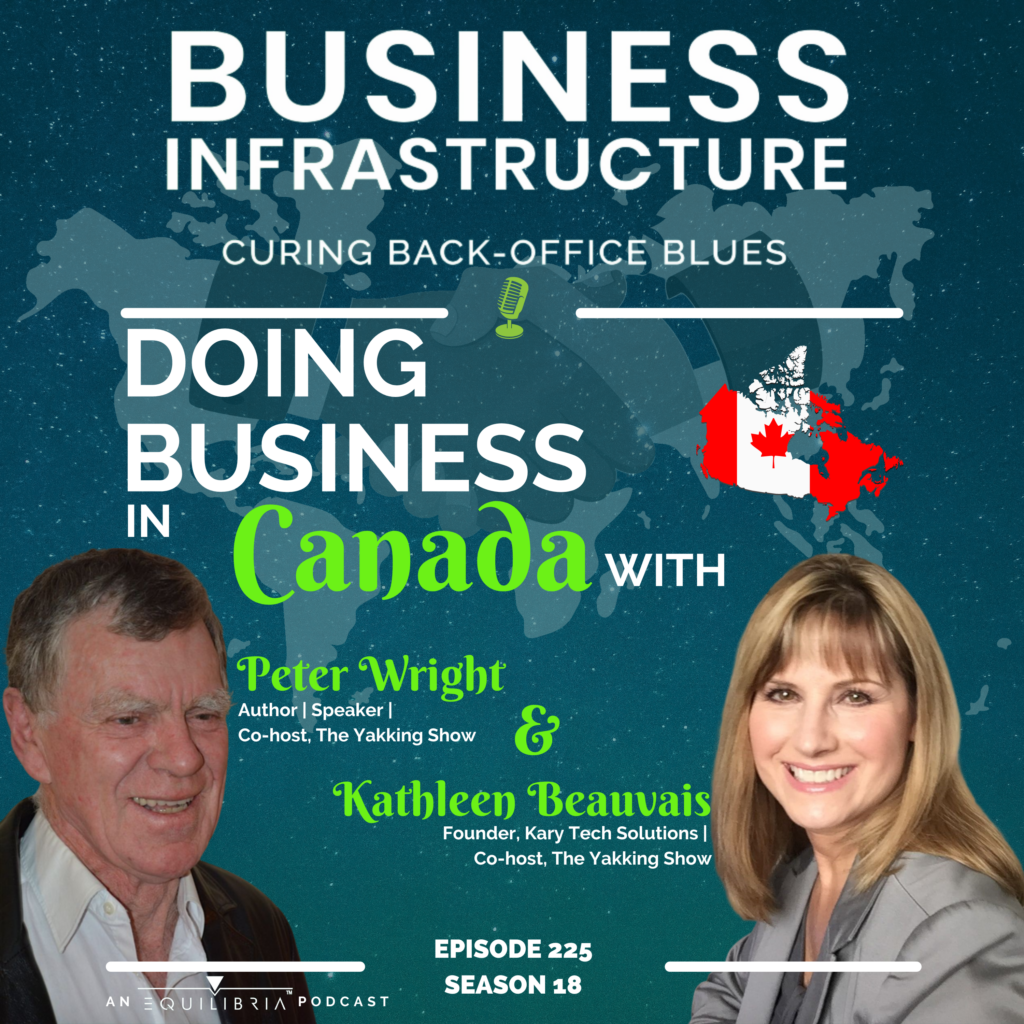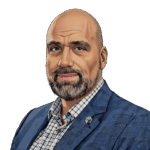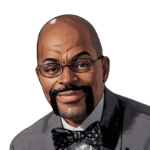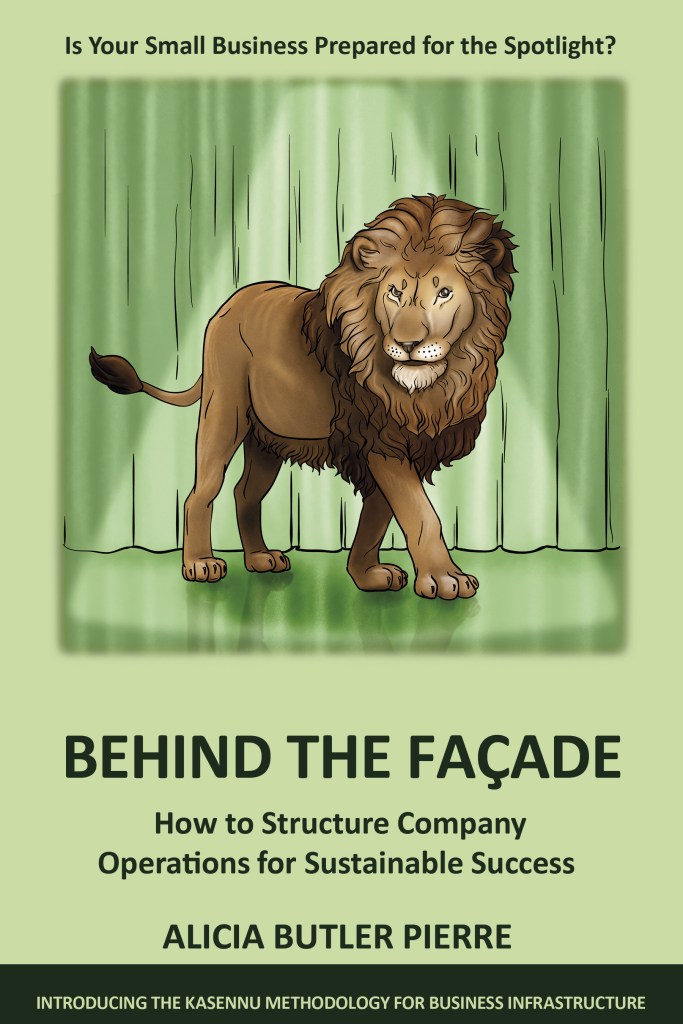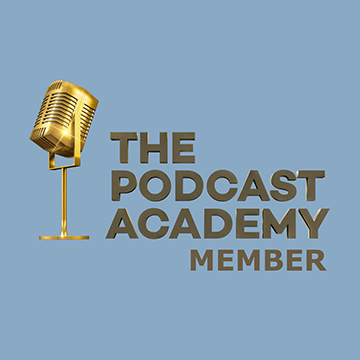Transcript
Hey! How are you doing? Still with us? We’ve had quite the adventure so far, haven’t we? Our 12-country tour started in Nigeria, then we went to Ireland, then England, and now we’re headed across the pond to Canada.
I’m Alicia Butler Pierre and this is Season 18 of the Business Infrastructure podcast – the show where we share operational tips, tactics, and tools for curing back-office blues. As we settle into our seats on Equilibria Airlines, we have quite a bit to process from the meetings we’ve had so far. So, it’s a good thing we have a longer flight. We need to be well-rested when we meet our next guests – these business partners are a ball of energy!

This episode is underwritten by Equilibria, Inc. the company behind this podcast where we design scale-ready business infrastructure for fast-growing small businesses.
Wake up sleepy head! We’re starting to make our initial descent into Toronto, Ontario in Canada. The sky is clear, and the waters of Lake Ontario are strikingly blue. Isn’t the skyline beautiful? Oh look! There’s the famous CN Tower! No doubt, Toronto is one of my favorite cities and luckily, we’re here before it starts to get really cold.
As the airplane taxis to a gate at the Toronto Pearson International Airport, we send a text message to Kathleen Beauvais and Peter Wright to let them know we’ve arrived. Next, we make our way to the rental car we’ve reserved. We have a nearly two-hour drive as we head to Kitchener. But I promise you, the commute will be worth it!
This is Episode 225 – Doing Business in Canada with Kathleen Beauvais and Peter Wright
Kathleen
I’m Kathleen Beauvais, and I’m located in Waterloo, Ontario, which is about an hour west of Toronto and I’ve been here since the eighties.
Peter
I’m Peter Wright. I’ll keep my story short. I was born in England, lived most of my life in Africa, and moved to Canada in 2003, 2004. And I live in a town called Woodstock, a little city of 40 odd thousand people, which is, further northwest from Kathleen. It’s about halfway between Toronto and Detroit on the Michigan border. That’s me.
As I mentioned earlier, Canada is near and dear to me. Several years ago, I did some work in Kitchener, Ontario. So, it’s a treat to meet Kathleen and Peter here at a restaurant called Williams Fresh Café – the very place where they first met, but we’ll get into that a little later. Kitchener is a twin city to Waterloo where Kathleen lives. Although she’s been in the province of Ontario for many years, she’s originally from Quebec.
Kathleen
Yes, I am French Canadian. I speak French to my father and English to my mother.
Quebec is the eastern neighbor of Ontario, so how did Kathleen end up there?
Kathleen
Well, I actually came to Waterloo to go to university, so I just never left. I managed to get a job straight out of University, I had friends here and all of a sudden it just became home really. And then my parents decided they were lonely and moved here as well.
And what about Peter? He mentioned living in Africa most of his life. So how did he end up in Ontario? Turns out he has quite the story.
Peter
The way I got there was that my father, was quite old when I was born, comparatively, he was, in his thirties because, I was born 1950, so that was not long after Second World War. And he spent time the military before the war. So, he was quite radically married, came out of the army, didn’t know what to do. Spent some time with the police, joined the British, civil service, and joined the foreign
office and got posted to the country of, as it was called, on a three-year tour. And he got an extension and another extension. But after nine years, they said, “You know, you, this is unprecedented. You’ve got to go back to England.” He said, “No, I like, I like Africa too much.” They resigned and started farming. So that’s how I ended up in Africa.
And Peter stayed in Africa for many years until he had no choice but to leave.
Peter
There was a terrorist war in Inia and things were not looking good. And I had two young boys to worry about. They were about ready to start school. So, I moved to South Africa, and I lived there for 14 years. And then, I worked in the corporate world, started my own business, had two businesses, and things went very badly.
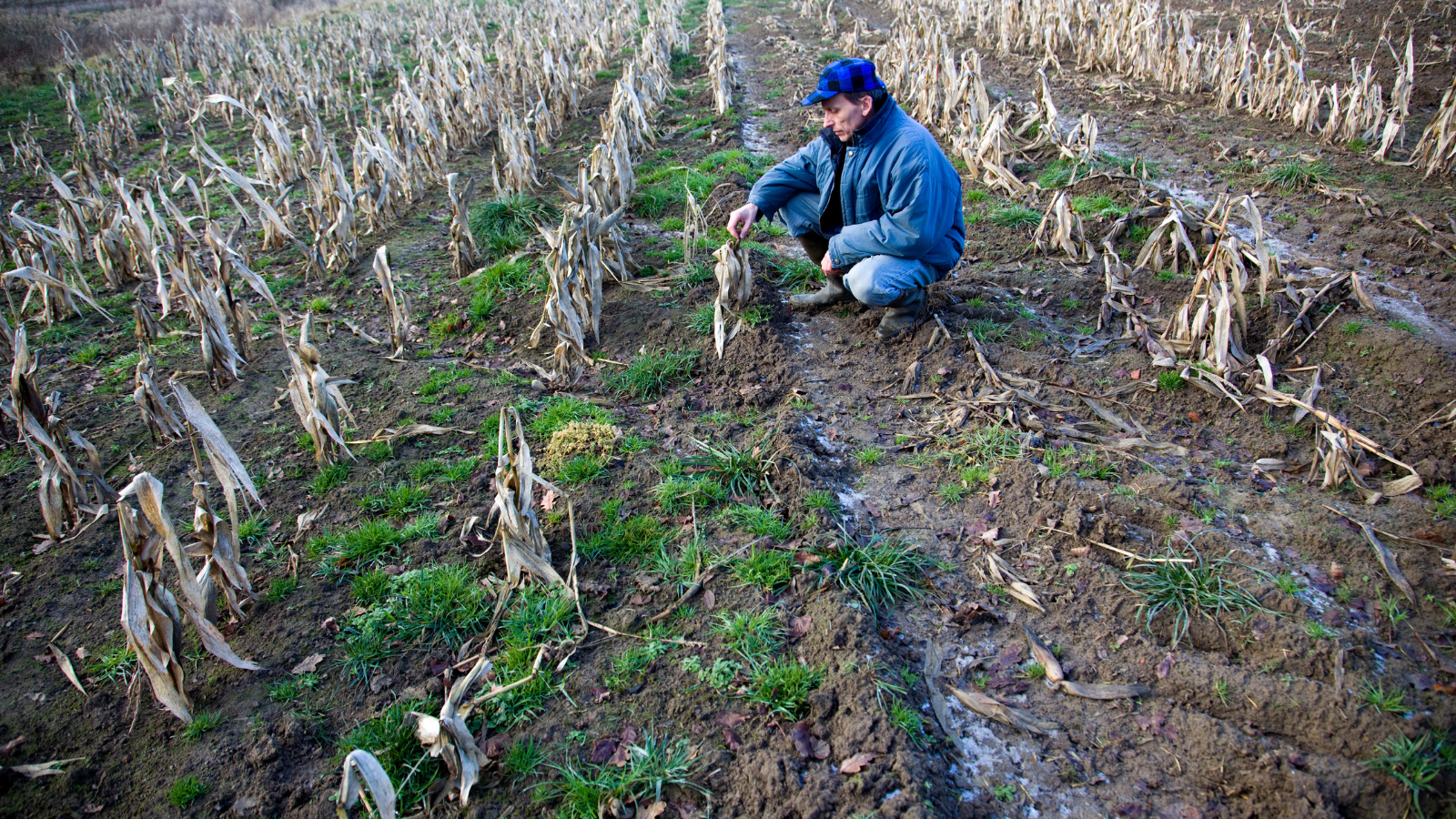
Civil war broke out in my two biggest markets at the same time, and I had some go on chips going north, and the some got lost, some got stolen. I didn’t get paid. So, I went down for a lot of money and, lost everything. My house, my marriage had fall into pieces. Because of the political change in South Africa where I was living, middle-aged white guys were virtually unemployable. So, my brother was still in Zimbabwe, and he said, “It’s fairly stable. Why don’t you come back?” So, I did and started another business and, lived there for quite a while. Met my current wife, took over her late parents’ farm, went farming, and then politics rear its ugly head, and the wheels fell off that and lost everything all over again. And that’s when I came to Canada. So that’s in a nutshell.
Wow! That’s a whole lot packed into that nutshell! 15 years’ worth to be exact. While Kathleen didn’t go far to land in Ontario, Peter did. I was curious. What led him to choose Canada? Turns out it had to do with one of his sons and his daughter-in-law who grew up in Canada.
Peter
My son saw more opportunity here than England. So, they immigrated here in ’98. So, when we had all the trouble, we would’ve liked to have gone to Australia for the climate, or come to your country, to the southern states for the climate more than anything. But as you know, coming to your country, if you haven’t got contacts and you haven’t got money and you can’t pay lawyers and get a green card, it’s not a good start. So that was out. Australia wanted a huge bond because we were middle-aged at which we couldn’t pay. So, Canada was a good option. That’s why we came here.
Hmm, very interesting. Okay, so we have an expat and a native Canadian. So, Kathleen, back to you. I see here that you started off with a business called New Age Health. Is that correct? Or did you just start off owning your own business?
Kathleen
No, I did work for an insurance company for about 15 years. And I, I realized, to be honest with you, the corporate world was killing me. it was just sucking the life out of me, if you will. And I knew I wanted to get out of it, and I had an entrepreneurial spirit. I just didn’t know what it was I wanted to do. And, after some exploration, I embarked on energy healing and quantum healing. And I embarked on this business called, biofeedback.
Kathleen operated that business for about nine years. And though she liked it, she couldn’t help thinking, feeling that something was missing.
Kathleen
I still wanted to be my own boss. That’s what I really, truly wanted, I wanted to have the autonomy. I wanted to be an entrepreneur. And I started exploring further. And that led me to doing online magazines, which is how I met Peter, through networking events and Peter and I struck up a friendship.
And that friendship started by their chance encounter here in Kitchener at a networking event held at Williams Fresh Café. Eventually, Kathleen and Peter would go into business together. In the meantime, Kathleen partnered with a former co-worker from her insurance days to found Kary Tech Solutions.
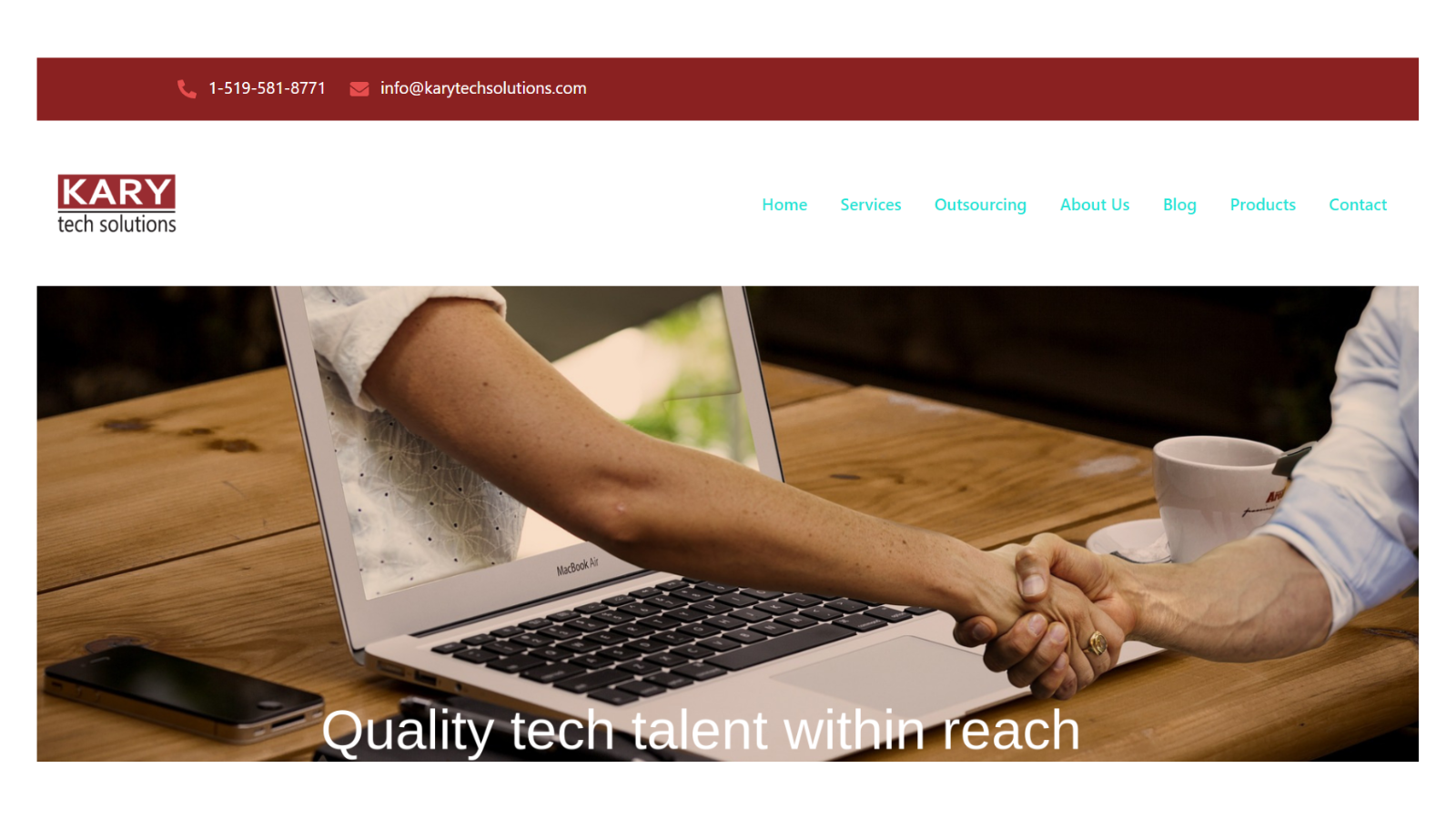
Kathleen
We do tech recruitment for companies here in North America that are looking to hire, someone in tech, either a developer or software engineers, anything in tech we help source, an employee for them based out of Serbia. We also have a dedicated tech team based out of Serbia. So, if a company comes to us and says, you know, we don’t have the capacity in house to develop, say, a mobile app or a web application, can you guys help us? And of course, we can.
This is fascinating. So, you go from insurance to, own business with biofeedback on to media and now also taking on tech. Wow! It just shows how multifaceted you are. It’s very impressive, Kathleen.
Kathleen
Oh, thank you for that. Absolutely. That’s the beauty of entrepreneurship you don’t have to be boxed into one particular career. You have that freedom and that flexibility to, to explore other things. I believe that’s how we’re all wired as human beings. We have multiple interests.
Kathleen
Absolutely.
Back to that networking event…when and exactly how did Peter and Kathleen meet?
Peter
I would say around 2015. We were at a, a networking event together, and I didn’t know anyone there. And Kathleen looked at this portal, guy looking totally lost in this restaurant and felt sorry for me. She said, “Well, I’ll look to you come and sit next to me.” Well, it was not quite like that, but it was sort of like that. But we hit it off it was a networking event where we gave a little five-minute presentation of our business, and we each told what we did, and I got interested in the magazine that she was doing, and we started another one, and it just led to other things. So that was the start.
The start of them working together on a magazine, which would eventually blossom into another media venture as well. We’ve heard how Kathleen got into media, but what about Peter?
Peter
So, when I came to Canada, I was my mid-fifties. I’d been out of the corporate world for, 15 odd years. I had no management experience in Canada whatsoever. And I had no network. I had no school friends, university friends, sports team, nothing. I knew nobody except my son, right So I thought I knew that my chances of getting a, a good paying management job were pretty much n I didn’t want to get back into corporate world. I had no money. And I didn’t know anything about starting a business in Canada. I thought, “What can I do?” I know about farming. So, I found a farmer who was looking for more than a laborer, and I, I worked for him for a few years doing irrigation and greenhouses.
And all was going well for Peter on the farm until one day…another life altering even happened that accelerated his decision to get out of farming altogether.
Peter
I had a heart attack.
Down, but not out and certainly not easily discouraged, Peter discovered a new tool during his recovery period – the internet!
Peter
I’d started fiddling around on the internet, learned how to build websites, and a bit of internet marketing and network marketing. So, I started public speaking and, then I met Kathleen and we started into other things. That’s how I made the transition. So, you start building websites, eventually you attend this networking event. Kathleen happens to be there, the two of you meet, and the rest is history, but what was the first thing you did together, in terms of collaboration? Or was it just a series of meetings? Did you all continue to just happen to bump into each other at networking events? At what point did you start working together?
Peter
Kathleen, you were doing the online magazine, right?
Kathleen
That’s right. Through networking, they always encourage you to do one-on-ones with people that you meet at these events because you just never have the time to really meet somebody and get to know them when there’s a room like 50 people. So, Peter and I decided to do just that, do a one-on-one and grab a coffee together, and we got to know each other during that time. And I explained to him what I was doing with these online magazines, and he seemed rather interested in that. And just one thing led to another, he thought, “Well, maybe we can do this together”. And we did that for a time, and we worked well together. That’s one of the things that we’ve discovered through all of this process.
We’re wonderful friends, but we’ve worked well together, and we were having fun.
Then, the covid-19 pandemic happened and Kathleen and Peter, like so many of us around the world, had to quickly adapt and change course.
All of a sudden, all the networking events dried up. We were stuck at home. Oh my gosh, what do we do to even get out and meet people and try to get business, try to make more connections for our individual businesses? That’s when the idea of the podcast came about. We thought, Well, why don’t we just try it? Maybe it’ll be our way of giving back to our community by starting and interviewing our local businesses first and giving them a little bit of exposure. And then one thing led to another, honestly, our podcasts, it, it just grew. And now we have an international audience, which is fantastic. So, we literally have interviewed people from all over the world and it’s continuing to grow.
Speaking of interviewing people around the world, this is a great segue into discussing what it’s like to do business in Canada. I wanted to know the good, the bad, and the ugly. What are some misconceptions? Myths? What do Kathleen and Peter like and what are some of their frustrations? I mentioned to both of them how while working in Canada, the people I befriended there were quick to point out to me that it is not the United States!
Kathleen
Nope!
Wow! You heard how quickly Kathleen responded to that? Like, nope, nope!
Kathleen
No, in fact, I can explain what I mean by that though.
Kathleen
So, what I love about Americans is that they really have an open mind when it comes to entrepreneurship. And I don’t know if it’s part of this following the American dream, but people are very open minded to new businesses and just new ways of doing business. I’m finding here in Canada; people are far more conservative and they’re a lot more cautious. That’s been my experience anyways. Even as a Canadian, I can say that. I don’t know about you Peter, but have you noticed that?
Peter
Yes.
Conservative in business, but not in everything else, right? But yes, you’re right.
That’s an astute observation by Peter. Clearly there’s a story behind his statement.
Peter
It was pretty simple. As I said, we lost virtually everything in Africa. So, I came with two suitcases. the first time I came, and my wife and I came on holiday because my son said, “Come see Canada.” And like most non-Canadians, we said, “Well, it’s all ice and igloos and you know, it’s frozen north. We don’t want to come there.” And he said, “In summer, where we are in Ontario, it actually gets hotter than where you are in Zimbabwe.”
He said, “We get warm, so you’ve got to see it!” So, we came at the coldest to make sure we could survive in the winter. And it was bitterly cold February, march. And I went and approach the immigration authorities, said, “This is the deal.” They said, “Because of what’s happened to you, we will let you come and live here before you get permanent residence under humanitarian and
compassionate grounds, or you can be a refugee.” And we said, “We don’t want to be refugees because then you’re told where to live, whatever.” So, we said, “Thank you very much. That sounds good.”
So, Peter and his wife, Sue, went back to Africa and gathered what belongings they could before officially relocating to Canada where they initially lived with his son.
Peter
We soon found an old farmhouse to live in at a low rent. And neighbors, people we knew started giving us stuff. So, we ended up from starting with two suitcases, having a house full of junk in a very short space at time, having hardly bought anything. People were so good. So that side of the move
was pretty easy.
What I found was very difficult…I had great ideas of starting a business and I found the red tape really difficult. South Africa is very sophisticated, but also has a third world element. So, there’s far less red tape. You know, if you want to start a business, it’s much easier. Same with Zimbabwe. So, I found that a bit of a struggle to start with. There’s an upside to that as well. Standards are good, it’s safe. The greatest difficulty was having no network, not knowing anybody. That was the biggest problem.
But clearly Peter turned things around. Coming up after the break, he and Kathleen will share more about starting and growing a business in Canada along with resources and advice to consider if you want to expand your operations there.
Do you need to grow your team but aren’t sure where to start let alone who to hire first? And what about processes? Do you have any of them documented so that people know what work to do and how to do it?

If you own a fast-growing small business and want a company that can consistently operate without your daily presence, then the Smooth Operator course is for you. It’s an online introductory course on business infrastructure that can provide you with proven tools, tactics, and techniques to calm the chaos and restore order. Go to SmoothOperator.courses to learn more. That’s SmoothOperator.courses.
We’re back with Kathleen Beauvais and Peter Wright. I don’t know about you, but I was shocked when Peter mentioned how surprisingly conservative things are in starting a business in Canada. But that’s not necessarily an indication of a lack of support for entrepreneurs and small businesses. Pay close attention as Kathleen and Peter weigh in…
Peter
I think despite what I said, and I’m coming from a background where it was very easy to start a business having got here and learned the system. and I mean that in a good way, it’s not that difficult to start a business. I’m not sure about the other provinces. I think they’re similar. Certainly, in Ontario, most reasonable size towns in our little city of 40,000 has a small business advisory office, which is run in conjunction with the Ontario Ministry of Commerce and Industry type thing. And they have huge resources. They put on webinars; they have all the documents. You can go and sit in that office and get on their computer, and the person there will guide you through how to set up a business, how to apply for a license, how to get a business name. they have a whole panel of experts
you can consult. So I would say there’s a lot of resources, a lot of help if you know where to look. A lot of people unfortunately don’t know where to look. So my short answer is, it’s quite easy. But I, going back to what Kathleen said, starting it is probably easy. Getting it to run successfully is a difficult part, right Because of the conservative attitude to entrepreneurs and small businesses.
Do you have to be a citizen to start a business in Canada?
Peter
No. If you’re going to form a corporation, one of your shareholders and directors has to be a citizen, or at least a permanent resident. But, to start a business, you don’t have to be a citizen. You can be a permanent resident.
You said something very profound. It can be easy if you know where to look. And that’s a big part of what this podcast is all about, we just don’t know what we don’t know, and we want to try to help close that knowledge gap.
Peter
One of the problems is created by the flood of resources available on the internet. You might not get the right answers on Google. Whereas if you think of thinking 20, 30 years ago, well, I’ll go to City Hall or I’ll look in the newspaper…that might be a better way of finding the resources I was talking about. Just walk up the main street in our little city, you will find the small business office. But, unless you know exactly what to look for on Google, you might not find it.
Kathleen
Great Point. And not to mention that each province, does things a little bit differently. So, to register a small business here in Ontario may be different in the next province over. And then there’s the taxes and placing a call to the Canadian Revenue Agency for all of that information. There is some information that you can look up online, but I think it requires calling people and just talking to
people, and especially talking to accountants on how to set the business up. And in fact, even lawyers as well.
With that in mind, let’s circle back to Kathleen and Peter’s podcast, The Yakking Show. It’s information like what they just shared that you could hear on their podcast – information that you can use to survive and thrive in business and in life.
Peter
We’d met many small businesses and professionals who, who were absolutely floored by the pandemic. They can’t get to networking events. Most of the businesses wear to mouth. What do they do? Panic, panic. Plus, in our general circle of context, there was just doom and gloom. And because of little bit of my story, I’ve told you, you’d appreciate, I’ve been through a lot more serious doom and
gloom than the pandemic. So high laugh, the whole thing off, said, “I’m not going to let this stop me!” So, we decided to start the podcast to help our small business context put a little bit of life back into the world for our audience.
And as Kathleen said, it took off! So, it quickly evolved from helping other small businesses to more audience focused, finding interesting people like yourself to interview on our podcast. And right from the start, we decided on a video plus audio format. Every episode has both, and we wanted to bring in interesting people so we could give our audience a, perspective to look at life in a better way, and to make them curious and to bring them information and give them ideas. And it’s grown from there.
This growth has me curious about the business infrastructure Kathleen and Peter have in place. Business infrastructure is a system for linking your people, processes, and tools so that growth happens in a sustainable, repeatable, and profitable way. What I thought was a team of people is, surprisingly, just the two of them. And they’ve been going strong for two and a half years now. How? Well, it turns out processes are a key element of their show’s business infrastructure.
Peter
Part of its success is we have a fairly good division of labor. Kathleen is better at finding guests, organizing guests and communicating with guests before we do the show. So, Kathleen, why don’t you go ahead and talk about how you put the guests onto our records and use? Why don’t you tell Alicia that?
Kathleen
You’re absolutely right, Alicia. I think when we’re doing something like this, it’s very important to have consistent a process, an app. And we do, so we work through Google documents. We have Asana, which is a platform that we use to, to set up our guests. and then we follow them through. So, at what point are they at? When are they booked? Once they’re booked, we need to do some research into them. We need to come up with questions to ask them. We need to share those questions with them. So, everything is a process, and we’ve worked this out over, gosh, it’s taken us a while to, to do that, but now it’s running like a well-oiled machine, I would say. The follow-ups after we’ve interviewed them to thank them for being on the show.
Kathleen
It’s requesting testimonials afterwards. There is a process when we got together, Peter and I had to put down on paper every step we had to take in order, from beginning to end, basically from A to Z whenever we dealt with a guest. And through that process, now it’s become a checklist. Have we done this? Yes. Have we done that? Yes. And so on.
By the way, this is a great idea since processes can be represented in a number of ways, including checklists. So, Kathleen described customer (or guest)-facing processes. But what about the back-end operational processes?
Kathleen
Peter is so good with all of the backend stuff, so the editing and the transcripts and all of that. He’s my champion actually, because he does a lot of, the background stuff. And then the social media, we both do. We come up with the questions for our guests together. We do the researching, together. He does his part. I do my part, and then together we have the parts that we work on as a team.
That is a beautiful thing. And I think having that type of team dynamic, that type of synergy goes a long way in making sure that these processes actually work. Because as we all know, you can have a really good process, but if you don’t have the people, to actually execute on that process, it just would not have the same effect and you probably wouldn’t be able to consistently do a show like
you’re doing, for as long as you’ve done it so far.
We’re starting to run out of time, but before we wrap up with Kathleen and Peter, now is a good time to inquire more about those resources Peter alluded to earlier.
Peter
We call them ministries. It’s essentially the department of our provincial government. So, each province will name them slightly differently. what’s ours, Ontario Ministry of Trade, I think it is. Most cities will have one, sometimes in conjunction with a Chamber of Commerce. That’s another excellent resource for anyone. They will direct any person looking to start a business to other resources. Chambers of commerce are excellent. And take heed to Kathleen’s advice too.
Kathleen
I would urge anybody, if they’re really interested in starting a new business, whatever province that they live in is to do their research online, talk to an accountant, because they might have other thoughts on how to set things up. I also urge everybody to consult a lawyer. I know it could be costly, but it’s well worth the money.
Peter
One of the big differences between the provinces is taxation. we have a value added tax system, which is called HST, harmonized [sales] tax in Ontario, but it’s made up of a provincial and federal tax. Some provinces don’t have a provincial tax, so, you can’t assume because you’ve heard the Ontario tax is 13% that it might be the same in another province and the thresholds at which you must start charging tax, that differ as well. That’s one that can trip a lot of people up. So, you need to get that straight with an accountant.
You might be wondering the best way to determine which province you’d like to do business in. Remember that advice Bhairav Patel gave back in Ep. 224? He mentioned networking online with people who have common interests first to understand the lay of
the land. This will help you get a sense of where you might want to temporarily live, network, or form strategic alliances to get an idea of the specific province involved. So…what’s next for our friends Kathleen and Peter?
Peter
We have some developments, which we haven’t even spoken about, but we’ll tell you another time. And one of those developments might be something you might want to look at down the track. We are, we at another level, a premium subscription level of, of, members for our show who get additional resources. That’s something we’re putting together right now. And it’s on our website, but
we are still finalizing it.
Okay. We might have to have a part two to this. Let’s see. and I just want to say, whenever I visit again, promise me that we can all get together and have some poutine! I was introduced to poutine and ketchup flavored potato chips.
Kathleen
Yes, they’re good.
I didn’t think I would like it, but I really do like it.
Kathleen
Oh, this is a, a quick funny story. I was in the United States a few, several years ago, and one of the
things I had ordered was some fries, and they brought me the fries and I said, “Oh, can I have vinegar
please?” And they looked at me and I thought, evidently vinegar on fries isn’t a thing in the United
States!
No, it’s not!
Peter
Alicia, when, when you do next come up, we will definitely get together for lunch when you’re here.
Thank you for that offer, Peter. In fact, lunch will be my treat. It’s the least I can do for all that he and Kathleen have done for me. They’ve graciously hosted me on The Yakking Show, and they make it a point to give me a shout out on Twitter every week!
Parting is such sweet sorrow, eh? (Did you catch that? That’s an ode to my Canadian friends!) But seriously, let’s thank Peter and Kathleen for spending time with us! Make sure you check out their podcast, The Yakking Show, as well as links to all the resources they shared for starting a business in Canada. We’ll have that information as well as what poutine is at BusinessInfrastructure.TV. In case you’re wondering, poutine is amazing, but totally unhealthy!
Well, we’re in the rental car now headed back to the airport in Toronto. Where are we going you might be wondering? You’ll have to stay tuned for the next episode to find out!

Thank you for tuning in! If you enjoyed this episode, then please subscribe and leave a five-star rating and review.
Starting, growing and scaling a business is no small feat but following veteran entrepreneurs like Kathleen and Peter and taking advantage of the resources they share through their work together can help you navigate pitfalls and challenges. Remember, we’re all here for you so stay focused and be encouraged. This entrepreneurial journey is a marathon and not a sprint.
This podcast was written, produced, and narrated by me, Alicia Butler Pierre. Audio editing by Olanrewaju Adeyemo. Original score and sound design by Sabor! Music Enterprises.
This is the Business Infrastructure – Curing Back-Office Blues podcast.


